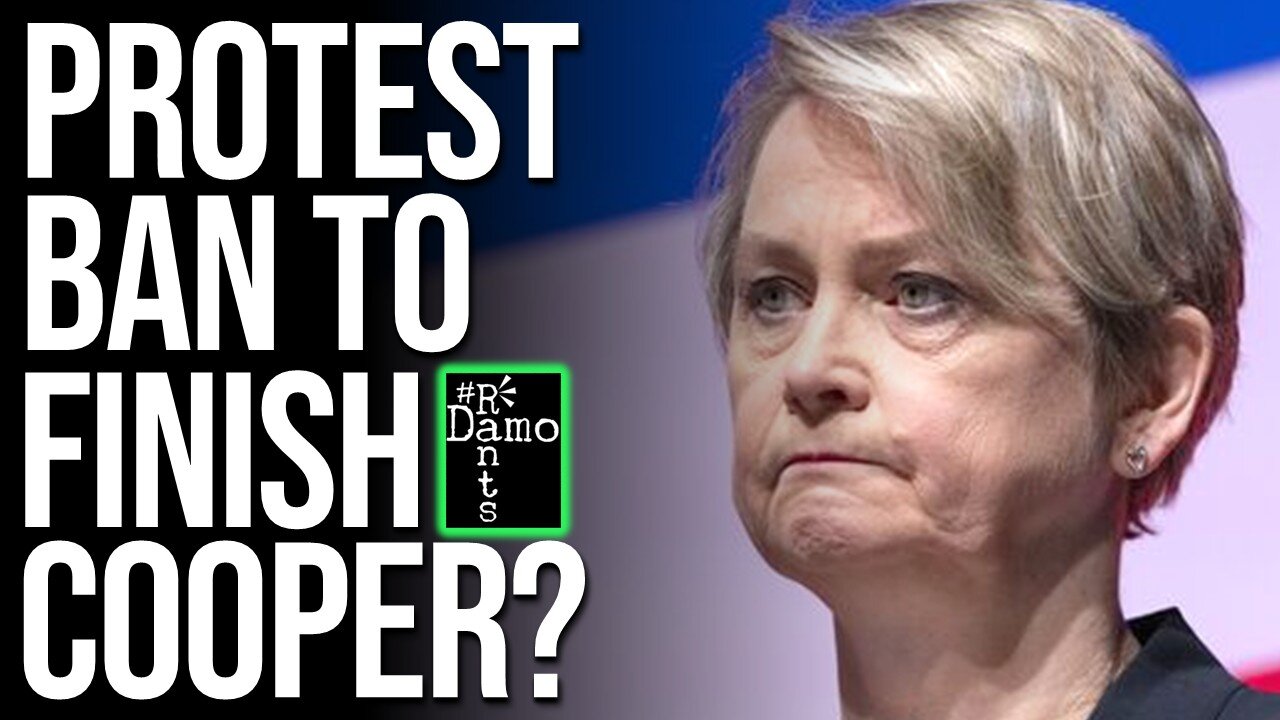Premium Only Content

Intel Leak Shreds Cooper’s Terror Claims - And Her Credibility
Right, so it takes a certain kind of political genius to turn your own intelligence service into your most credible opposition. Yvette Cooper, it seems, has managed it with a flourish. In the grand British tradition of “never let the facts ruin a perfectly good crackdown,” the Home Secretary has proscribed Palestine Action on grounds so flimsy that the government’s own terrorism analysts appear to have filed them under “does not exist.”
Cooper would have you believe this is a clear-cut matter of public safety: violent attacks, foreign funding, racist targeting, and terrifying plots foiled in the nick of time. But according to the Joint Terrorism Analysis Centre — the cross-agency brains trust she’s supposed to rely on — the reality is closer to trespass, paint, and a bit of creative sabotage. In other words, a minister has declared war on a protest group with the rhetorical force reserved for Al-Qaeda, while her own security experts quietly note that the case for proscription could be filed under “doesn’t meet threshold.”
If the judicial review now breathing down her neck goes the way the evidence suggests, this could end up less “protecting national security” and more “publicly detonating one’s own credibility” — and any and all claims of acting in the national interest on national security grounds going forwards should be taken in the same vein as Pinocchio and in that regard and that of these government analysts, Cooper’s nose ought to be about ten feet long by now.
Right, so in what has to be one of the most extraordinary uses of terrorism powers in decades, abuses of said powers as it appears to be in fact, Home Secretary Yvette Cooper has outlawed a protest movement on claims her own intelligence service did not support. She told Parliament and the public that Palestine Action was a violent threat, bankrolled by hostile powers, targeting Jewish-owned businesses out of racism, and plotting “appalling terrorist acts.” Yet the government’s own Joint Terrorism Analysis Centre (JTAC) — the body tasked with producing the definitive, cross-agency security assessment — found none of these things.
By exaggerating threats absent from JTAC’s report, the Home Secretary may have fatally undermined her own ban — and her credibility. If the courts confirm the gap between rhetoric and intelligence at the Judicial Review in November, the proscription could well collapse, and with it the political standing of one of Starmer’s most high-profile ministers.
To grasp the magnitude of this latest course of events, lets take a look at what Cooper told Parliament, what JTAC actually said, how the two accounts differ, and what the political, legal, and democratic consequences will be if the court rules that Britain’s own security service was misrepresented to justify one of the harshest legal measures available to the state, all, seemingly, to shut down the right to protest via direct action.
Cooper’s ministerial statement on 23 June painted Palestine Action as a direct and immediate threat to public safety. She claimed the group had “crossed the threshold” under the Terrorism Act 2000, embarking on “a nationwide campaign of direct criminal action” against defence and security infrastructure. Criminal action? Well sure they caused damage, but terrorism? JTAC don’t appear to agree. She cited the breach of RAF Brize Norton on 20 June — where activists gained access to a high-security airbase and sprayed red paint into the engines of two aircraft, not even owned by the state but privatised and owned by a hedge fund — as evidence of their capability and intent.
But the allegations did not stop at property damage. Cooper told MPs and the public that Palestine Action was engaged in attacks on people, not just equipment. She claimed the group was receiving funding from Iran or another hostile state. She alleged that it was deliberately targeting Jewish-owned businesses as part of a racist campaign. And she said she had seen intelligence about future “appalling terrorist acts” that could not be disclosed in advance.
These were not cautious words. They were sweeping and categorical, the kind of allegations designed to persuade MPs that proscription was unavoidable. They also served to present Palestine Action not as a disruptive protest group but as a genuine terrorist organisation — and thus to place any association with it firmly outside the bounds of legitimate political activity.
The accompanying Home Office press release underscored the point, grouping Palestine Action with two other organisations accused of violent extremism, because that is what it took to get the vote through – sleight of hand. Ministers insisted the move was ideologically neutral and targeted only at unlawful activity, not lawful protest. What the public and Parliament were not told was that the very intelligence service tasked with making the threat assessment — JTAC — did not support the key planks of this public case.
The Joint Terrorism Analysis Centre is the UK’s highest authority on terrorist threat assessments. Hosted within MI5 but staffed by analysts from across the intelligence and security community, including MI6, GCHQ, the Ministry of Defence, Counter Terrorism Policing, and the Home Office, JTAC integrates intelligence from all sources to provide ministers with definitive threat analysis. Its assessments inform the national threat level and underpin decisions to apply the state’s most coercive powers.
The purpose of JTAC’s cross-agency structure is to insulate its work from political distortion. Its reports are intended as objective, evidence-based statements of fact. While ministers are not formally bound to follow JTAC’s recommendations, any departure from them would normally require compelling, documented justification. In the context of a proscription decision, JTAC’s assessment is supposed to be the foundation stone: the factual record on which the Home Secretary builds her case.
If the leaked accounts of JTAC’s 7 March 2025 report on Palestine Action are accurate, the gulf between that foundation and Cooper’s public statements is not a matter of emphasis but of substance.
According to Skwawkbox, which has examined material from the JTAC report, the assessment depicted Palestine Action as a protest movement engaged in illegal but targeted acts of property damage. Its operations were overwhelmingly aimed at arms companies and infrastructure linked to the Israeli military supply chain. The RAF Brize Norton action was noted as part of this pattern: damaging equipment to disrupt its use, not to harm individuals.
On funding, JTAC concluded that Palestine Action relied on supporter donations, merchandise sales, and small-scale online crowdfunding. No evidence was found of funding from Iran or any other hostile state.
The assessment found no evidence of a deliberate or systematic campaign of physical attacks against people. It stated that targets were chosen for their role in the arms industry, not because of the ethnicity or religion of their owners. There was no intelligence to support claims of antisemitic motivation therefore.
Looking ahead, JTAC anticipated further direct action against property and infrastructure but did not forecast indiscriminate or mass-casualty attacks.
In short, JTAC’s description fits a movement that breaks the law through sabotage and trespass — serious matters in their own right, they certainly do commit criminal damage, that is direct action for you though — but not a terrorist organisation in the common or legal sense of the term.
Placed alongside Cooper’s public claims, JTAC’s account reads like a refutation. She claimed Palestine Action attacked people; JTAC described a focus on property. She claimed hostile state funding; JTAC found no such link. She alleged racist targeting; JTAC found none. She warned of “appalling terrorist acts”; JTAC saw more of the same direct action against equipment.
This is the reversal at the heart of the controversy. The security service tasked with informing the decision did not substantiate the most serious allegations used to sell it to Parliament. If ministers can tell the public one thing while their own intelligence service says another, the integrity of the decision-making process collapses.
In a democracy, proscription should be a last resort, applied only when the evidence is overwhelming and capable of withstanding public scrutiny. Yet in this case, no supporting evidence for Cooper’s most serious claims has been placed in the public domain. There are no arrest records proving a pattern of attacks on individuals, no financial records linking Palestine Action to Iran, no intercepts or surveillance logs showing plans for lethal violence, no material establishing antisemitic targeting.
The absence is telling. It suggests either that such evidence does not exist or that it is so sensitive it cannot even be summarised for public consumption — an implausible position when other terrorism cases routinely involve at least partial disclosure.
Palestine Action co-founder Huda Ammori has secured a judicial review of the proscription. A High Court judge has already ruled that it is “reasonably arguable” the Home Secretary had a duty to consult before making the decision. But beyond that procedural point lies the substantive question: was the decision based on an accurate and honest assessment of the threat?
British public law requires that ministers make decisions on the basis of accurate facts and that they do not mislead Parliament. If the court finds that Cooper’s public statements materially misrepresented JTAC’s assessment, it could quash the proscription as irrational or procedurally unfair. Such a ruling would not only remove the ban but could collapse prosecutions brought under it and inflict severe political damage on this government, far too free with their authoritarian leanings as they already are.
Skwawkbox’s reporting sets out the JTAC findings in detail, emphasising the absence of support for the four core allegations in Cooper’s case. Former ambassador and very much current journalist Craig Murray, writing on his blog, is even more direct. He accuses Cooper of lying, makes mention of her being part of Labour Friends of Israel which very much bring into question her motivations here, the £215,000 she’s had from the Israel Lobby a great deal more than Palestine Action has ever received, especially in light of those funded by a foreign power allegations. In his view, the government’s misrepresentation is not an accident but a deliberate attempt to recast a protest movement as a terrorist organisation.
Why would the government risk such a contradiction though? The most obvious explanation is that Palestine Action has been highly effective at disrupting the arms trade and drawing public attention to UK complicity in Israel’s military operations in Gaza. By proscribing the group, ministers can not only curtail its activities but also send a signal to other protest movements that disruptive action will be met with the harshest possible legal response.
There may also be electoral considerations. For a Labour leadership keen to avoid the perception of being soft on security, taking a tough line against a group portrayed as extreme could be politically advantageous. Diplomatic and commercial pressures from allies and the defence industry may also have played a role.
This case fits into a long history of UK governments inflating threats to justify extraordinary measures. The Iraq WMD dossier is the most infamous example, but the pattern can be seen in the policing of the miners’ strike, the treatment of climate protesters, and the rhetoric around anti–Police, Crime, Sentencing and Courts Act demonstrations. In each instance, dissent was reframed as a security threat to mobilise powers that would not otherwise have been available.
The JTAC contradiction is therefore more than an embarrassment — it is a democratic crisis. If intelligence assessments can be overridden or distorted without consequence, then the safeguards on which our freedoms depend are hollow. Today’s target is Palestine Action; tomorrow’s could be environmental activists, anti-austerity campaigners, or striking workers. The line between protest and terrorism becomes whatever a minister says it is.
If the judicial review forces the release of the JTAC report, the leaked version alone is damning after all, the fallout could be significant: the ban mayt be struck down, current prosecutions could be dismissed, and Cooper’s ministerial position would become untenable. She’s staked her career on this absurdity. It would set a precedent for challenging similar overreach in future and could trigger reforms to how proscription decisions are made.
To prevent such abuses, the JTAC assessment in any proscription case should be made available to Parliament in full, with redactions only where absolutely necessary. An independent oversight body with the power to review and block unjustified bans should be established. Ministers should be legally obliged to ensure that their public statements align with the intelligence they receive, and penalties should exist for deliberate misrepresentation. The definition of terrorism in the Terrorism Act 2000 should be tightened to exclude property damage without intent to harm people.
The proscription of Palestine Action is not just about one group — it is a test of whether Britain’s most coercive powers will be anchored in truth or twisted time and again for political ends, because of Cooper and Starmer get away with it here, they’ll do it again. The JTAC report, if accurately reported, shows that the Home Secretary’s public case was built on allegations her own intelligence service did not support. That is a false prospectus, and in a functioning democracy it would not be survivable for a minister.
The courts now have the opportunity to determine whether the law was misapplied. Parliament has the responsibility to demand transparency. And the public has the right to know whether the government will tell the truth when wielding powers that can destroy lives and stifle dissent. If those institutions fail to act, the precedent will be set: that protest can be criminalised not because of what it is, but because of what a minister says it is — even if the facts say otherwise.
Whilst Cooper faces a likely uncomfortable court case in the near future, so might Keir Starmer. The spy flights over Gaza are still continuing under UK instruction, even if a US firm is now carrying them out instead of the RAF, but in light of such a flight being in the air at the time journalists Anas al-Sharif and his colleagues were killed in an Israeli airstrike, and an ICC investigation might be about to demand any intelligence the UK may have collected on that. Does he want to say no to the ICC? Check out the details of that story in this video recommendation here as your suggested next watch.
Please do also hit like, share and subscribe if you haven’t done so already so as to ensure you don’t miss out on all new daily content as well as spreading the word and helping to support the channel at the same time which is very much appreciated, holding power to account for ordinary working class people and I will hopefully catch you on the next vid. Cheers folks.
-
 LIVE
LIVE
VapinGamers
2 hours agoAltheia - The Wrath of Aferi - Game Review and Playthru - !rumbot !music
53 watching -
 2:06:32
2:06:32
TimcastIRL
4 hours agoLeftist NO KINGS Protest Begins, Antifa EMBEDS, Riots & Violence FEARED Nationwide | Timcast IRL
163K101 -
 2:50:31
2:50:31
TheSaltyCracker
4 hours agoHail to the King ReeEEStream 10-17-25
56.8K123 -
 56:04
56:04
Man in America
12 hours agoGold’s OMINOUS Warning: A Global Monetary Reset That’ll BLINDSIDE Americans
22.3K5 -
 1:33:32
1:33:32
Flyover Conservatives
22 hours ago3 Winning Mindsets for Building Life-Changing Habits - Clay Clark; Why Employers Are Ditching DEI - Andrew Crapuchettes | FOC Show
24.9K -
 LIVE
LIVE
SynthTrax & DJ Cheezus Livestreams
1 day agoFriday Night Synthwave 80s 90s Electronica and more DJ MIX Livestream POST DISCO / FUNK / R & B Edition
252 watching -
 51:18
51:18
Degenerate Jay
12 hours ago $0.30 earnedJournalist Claims Batman Is A Fascist Like Donald Trump
15.9K6 -
 1:18:27
1:18:27
Glenn Greenwald
8 hours agoGlenn Takes Your Questions on Major Saudi Arabia Celeb Controversies, Zohran Mamdani and the NYC Debate, Anti-ICE Protests, and More | SYSTEM UPDATE #533
114K32 -
 1:13:26
1:13:26
Tundra Tactical
9 hours ago $3.22 earned🛑{LIVE NOW} Gun Nerd Plays Battlefield 6 Great Tundra Nation Get Together Day 4
22K1 -
 LIVE
LIVE
GritsGG
8 hours agoRanked Top 70! Most Wins in WORLD! 3734+!
118 watching